A beacon of hope for the preservation of coral reefs
An amazing piece of tapestry by Algarve textile artist Vanessa Barragão has been donated by the Portuguese government to the United Nations, which will display it permanently on the wall of the Delegates Lounge at its headquarters in New York.

The four-by-two meters artwork, entitled Coral Vivo (Living Coral), aims to be a beacon of hope for the preservation of corals. It took two months to create, using only recycled materials such as wool and lyocell.
Despite her 31 years of age, Vanessa Barragão has already exhibited her art around the world, from the USA to Shanghai and from Australia to Japan. She admitted that being invited by the government to donate this piece to the UN stands out as one of her most impressive achievements.

It’s no surprise that the oceans – and corals specifically – are such a strong inspiration for her. She was born in Albufeira, where she spent her childhood at the beaches of the Algarve and used to travel with her parents to coral reefs in the Caribes. When she turned 18, she left home to study Fashion Design at the University of Lisbon. During that time she became more conscious about consumption and sustainability.
After her study she moved up north, where she worked as a textile designer at an artisanal carpet factory in Póvoa de Varzim. It was during this period that she became aware of the amount of waste generated by mass production and the extreme pollution in the textile industry.

In 2020 she decided to move back to the Algarve where she opened her own studio and combined her ecological awareness with techniques based on ancestral textile practices like crochet, weaving, embroidery and macrame. All the materials used come from waste and leftovers from Portuguese factories.

‘Just as the delicate yet resisting threads in this tapestry, all life on the planet is intermeshed in an intricate and co-dependent network. Coral reefs are among the most stunning habitats with the greatest biodiversity on our planet but are extremely threatened,’ Secretary-General António Guterres stated, when the tapestry was officially donated to the UN on the 18th of March in New York.

Coral reefs are not only stunning, they also matter. Although covering less than 1% of the ocean about 25% of all marine species are found around them. Due to the global heating crisis, ocean record temperatures have caused corals to bleach in the three tropical basins of the Atlantic, Pacific and Indian Ocean.
Australia’s Great Barrier Reef – the planet’s biggest coral reef covering an area a little larger than the size of Italy – is experiencing its most widespread bleaching on record. ‘It is a graveyard out there’ according to professor Terry Hughes, a renowned veteran coral scientist.
Enjoy your week Aproveite a sua semana (pic Ptres/Sapo)















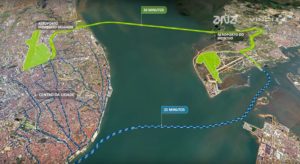 The Socialist Government of Antonio Costa is convinced that upgrading Montijo Air Force Base 6 on the south bank of Lisbon’s Tagus estuary, is the best option.
The Socialist Government of Antonio Costa is convinced that upgrading Montijo Air Force Base 6 on the south bank of Lisbon’s Tagus estuary, is the best option. In addition, the national airline
In addition, the national airline  Moreover, at least 30.000 citizens in the Netherlands have signed a petition objecting to the ‘ecologically disastrous plan.’ It concerns the survival of Netherlands national
Moreover, at least 30.000 citizens in the Netherlands have signed a petition objecting to the ‘ecologically disastrous plan.’ It concerns the survival of Netherlands national  Researchers also say birds are at risk of colliding with aircraft and will be driven away by the noise. The reaction of Secretary of State Alberto Souto de Miranda was stunning ‘people should not worry because birds are not
Researchers also say birds are at risk of colliding with aircraft and will be driven away by the noise. The reaction of Secretary of State Alberto Souto de Miranda was stunning ‘people should not worry because birds are not  The latest obstacle in starting construction on a 1.3 billion euro project are two Communist-led
The latest obstacle in starting construction on a 1.3 billion euro project are two Communist-led  Lisbon is Europe’s Green Capital 2020. A recognition of the work the city has been done over the past years towards a greener and more people-friendly city (
Lisbon is Europe’s Green Capital 2020. A recognition of the work the city has been done over the past years towards a greener and more people-friendly city (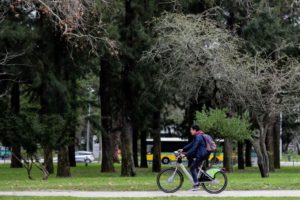 Extension of
Extension of 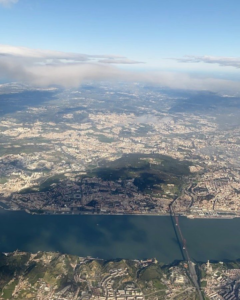 To date, the capital has around 800.000 trees. Lisbon’s biggest – 10 km² sized – Monsanto park, not only generates much-desired shadow but captures CO2 as well. One of the first initiatives of the City Council in January has been the planting of
To date, the capital has around 800.000 trees. Lisbon’s biggest – 10 km² sized – Monsanto park, not only generates much-desired shadow but captures CO2 as well. One of the first initiatives of the City Council in January has been the planting of  Although the sale of electric cars doubled in 2019, compared to the previous year, there are only 1000 public
Although the sale of electric cars doubled in 2019, compared to the previous year, there are only 1000 public 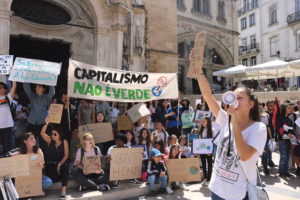 It is difficult to understand why the city is mobilized to be the Green Capital 2020 when major political decisions point into the
It is difficult to understand why the city is mobilized to be the Green Capital 2020 when major political decisions point into the  Portugal prepares to vote in Sunday’s general election.
Portugal prepares to vote in Sunday’s general election. For the ruling Socialist party (PS) climate change adaptation is also needed. But that isn’t enough. The party defines concrete targets for 2030 and others for 2050, such as carbon neutrality. The PS wishes to reinforce the capacity of wind farms and – faced with extreme weather – extend forecasting and warning systems. Empowering farmers ‘to adopt good practices’ is also called for.
For the ruling Socialist party (PS) climate change adaptation is also needed. But that isn’t enough. The party defines concrete targets for 2030 and others for 2050, such as carbon neutrality. The PS wishes to reinforce the capacity of wind farms and – faced with extreme weather – extend forecasting and warning systems. Empowering farmers ‘to adopt good practices’ is also called for. The Left Bloc (BE) is in favour of a Climate Law, an Energy Base Law and a Ministry of Climate Action. The far-left party advocates the end of fossil fuel car production by 2025 and coal-fired power generation by 2023, in the meantime accelerating solar production. It also intends to ban cars from city centres and strives for free public transport, favouring investment in ‘rail mode’.
The Left Bloc (BE) is in favour of a Climate Law, an Energy Base Law and a Ministry of Climate Action. The far-left party advocates the end of fossil fuel car production by 2025 and coal-fired power generation by 2023, in the meantime accelerating solar production. It also intends to ban cars from city centres and strives for free public transport, favouring investment in ‘rail mode’. The millennium Animal and Nature party (PAN) – founded in 2009 – wants vegetarian meals at state-sponsored events, prevention of any exploitation of hydrocarbons and the closure of all coal plants by 2023. Furthermore financial benefits for cycling to work, measures to reduce car traffic, restrictions on night air traffic and the suspension of the construction of a new airport.
The millennium Animal and Nature party (PAN) – founded in 2009 – wants vegetarian meals at state-sponsored events, prevention of any exploitation of hydrocarbons and the closure of all coal plants by 2023. Furthermore financial benefits for cycling to work, measures to reduce car traffic, restrictions on night air traffic and the suspension of the construction of a new airport. However, the level of commitment of all six major parties is far too low, argues a group of independent citizens,
However, the level of commitment of all six major parties is far too low, argues a group of independent citizens,  The polls suggest António Costa’s Socialist party will win but fall short of an absolute majority in parliament.
The polls suggest António Costa’s Socialist party will win but fall short of an absolute majority in parliament.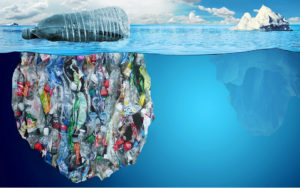 Plastic has proven to be indispensable in our global economy; most is used as packing material. Despite the fact that over 13 million tons of
Plastic has proven to be indispensable in our global economy; most is used as packing material. Despite the fact that over 13 million tons of  In Europe circa 30% of plastic is recycled.
In Europe circa 30% of plastic is recycled.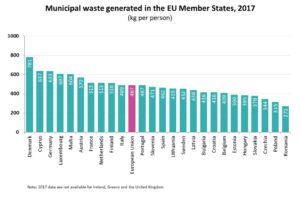 Every Portuguese citizen produces about 480 kg of garbage per year (~
Every Portuguese citizen produces about 480 kg of garbage per year (~ 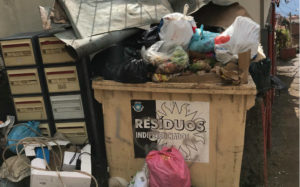 Since the
Since the  Each year the Portuguese throw away
Each year the Portuguese throw away  Lisbon Airport is congested and overcrowded, a victim of a
Lisbon Airport is congested and overcrowded, a victim of a  Nevertheless, growth is skyrocketing and a further boost of 10 million passengers is expected over the next 5 years. The 75 years old airport certainly can’t cope, despite its clean appearance, tasty food, and nice shops.
Nevertheless, growth is skyrocketing and a further boost of 10 million passengers is expected over the next 5 years. The 75 years old airport certainly can’t cope, despite its clean appearance, tasty food, and nice shops. The ecological movement
The ecological movement 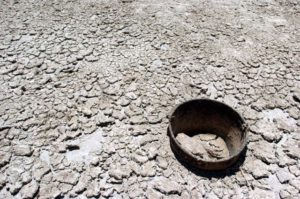 July turned out to be one of the driest months in the past 17 years. Water levels in dams and basins have dropped substantially.
July turned out to be one of the driest months in the past 17 years. Water levels in dams and basins have dropped substantially. Although water is scarce, wine is not!
Although water is scarce, wine is not!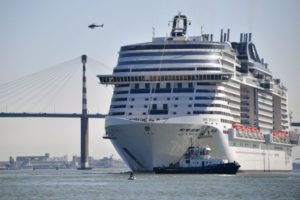 Niemand minder dan de 82-jarige Sophia Loren doopte begin deze maand in Le Havre het – volgens de eigenaar – 8e wereldwonder.
Niemand minder dan de 82-jarige Sophia Loren doopte begin deze maand in Le Havre het – volgens de eigenaar – 8e wereldwonder.